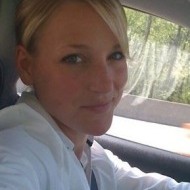
In the third edition of Praescient’s Employee Spotlight, we’re calling out an exceptional Embedded Analyst – Jorie Salyers. Like the previous spotlight profiles, she exemplifies our unique approach to analysis, technology integration, and software engineering. Jorie has been with Praescient from nearly the beginning and has provided critical analytical support and training to a range of clients, all while deployed across the globe. She took some time out of her busy day for a telephone interview:
Charlotte: You were one of the first new hires at Praescient. What has it been like to watch the company grow to where it is today?
Jorie: It’s pretty surreal, I would have never fathomed being able to be part of something small and watch it blossom into something bigger. Despite our size, we’ve tackled really cool and unique problem sets. Our people are involved in problems that really matter – that’s always been our trademark, changing the way the world uses analytics. We’ve had an amazing opportunity to do that through these niche problem sets. But what I take away the most from it is to be involved in a small company that, through all its growth, hasn’t lost sight of its missions throughout the world. Sometimes that can happen through growth.
C: You’ve worked on several deployments and missions since starting here at Praescient, from countering cyber threats, supporting large military units, and providing analytical support to the Special Operations community. Is there much overlap between these different missions?
J: Each mission will change per each client. Each commander or leader has their own intent and vision of what they want to accomplish in the world. So an entire branch of the armed services has a responsibility to respond to every global problem out there, while a Special Operations unit is focused on very specialized, quieter missions sets. Whether the results of your efforts are apparent in front page news or going on discretely behind the scenes, I know we’re making a huge impact.
Being able to work on these very different problem sets has definitely kept me on my toes. Working in these communities, there is a sense that you have to prove your worth or move on. The mentality is “you either bring something to the table or move on out.” In the end, if you go into a position and work your butt off that’s what really counts. There’s nothing better than seeing your hard work get results.

To Jorie, each branch of the U.S. Military is equally awesome.
C: You are one of the several former Marines working at Praescient. Do you think any of that training or perspective carries over?
J: You know, I don’t really have any more love or more pride for the Marine Corps over the other services. When I was in military, I did so much with Special Operations and other units, really interacting with a blend of services. For me, it is a sense of duty that’s present in all the branches – that’s what I respect. It can be green, it can be blue, it can be olive green, could be airmen – to me, the common thread is the love of country. I mean, all of people in the services are really bad-ass.
C: You’ve been called out several times for the ability to drive user adoption on analytic platforms. How have you been able to achieve this?
J: What’s been the most effective for me is what I call “proof of concept.” Whether its generals or lance corporals I sit down and tackle their problems with them. It’s all about focusing on one person at a time with dedicated attention to their unique problem sets because, to them, that’s their most important priority. And when you start to invest time to wrap your mind around your client’s mission, you become personally invested in their goal. You want to see the solutions come to fruition.
Having this personal investment has become very motivational to me. Seeing the hard work that I’ve helped to enable taken to high level leaders and ultimately impact mission briefs, reports, and actions is incredibly rewarding. I am only successful through the people that I help be successful – that’s the only reason I’m being called out in this spotlight.
C: What new applications would you suggest to the developers of analytic software?
J: I think there are a lot of use cases that haven’t been tailored quite right to the platforms. What’s missing are use cases related to unconventional warfare, border security, and attacks on civilian targets. The platform’s advocates should bring their capabilities to state, municipal, and local governments, to offer a step towards tackling these problems. Other problem sets that this software can address are identifying drug trafficking routes or combating human trafficking, as we’ve recently demonstrated. It can even be use to reduce inefficiency in large institutions. We can use the tool to identify broken processes at a state and local level.
C: With your worldwide deployments, you have become a seasoned traveler. What’s the best place you’ve been above all?
J: You know, I did really love Hawaii, but there’s something to be said about missing home. The only reason I’ve been able to do these things and be successful is my family. I owe all of this to them. They’ve been through a lot of punishment with my deployments and being away from home for so long. If I had a free ticket to go back to any of the places I’ve visited, I wouldn’t go anywhere else but home.
Check back with the Praescient Ideas Blog for the next edition of our Employee Spotlight.
Praescient Analytics is a Veteran-Owned Small Business that delivers training, data integration, platform customization, and embedded analytical services in partnership with leading technology providers. Praescient’s teams of analysts and engineers provide comprehensive solutions to federal and commercial clients engaged in critical defense, law enforcement, intelligence, cyber security, financial, investigative, and legal analytics missions.
Charlotte Stasio is Praescient’s Communications Specialist.